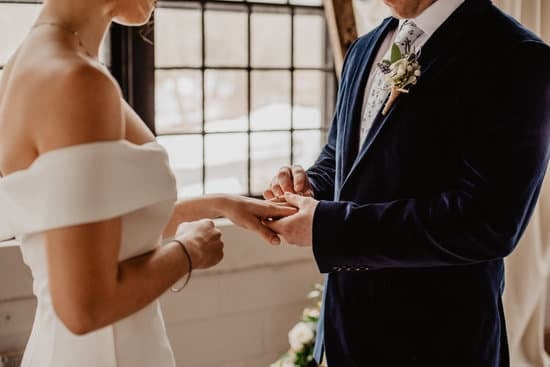Can you officiate a wedding without being ordained? Officiating weddings is a crucial role in the ceremony, as this individual leads the couple through their vows and pronounces them married. Traditionally, officiants are ordained ministers, priests, or rabbis recognized by a religious organization. However, there are also ways to officiate weddings without being ordained, which we will explore in this article.
Understanding the role of an officiant goes beyond just performing the ceremony; they also help create a meaningful and personalized experience for the couple and their guests. The officiant sets the tone for the wedding, reflects the couple’s values and beliefs, and ensures that legal requirements are met. Their presence is essential in making the ceremony memorable and special for all involved.
Before diving into whether you can officiate a wedding without being ordained, it’s important to note that legal requirements vary from state to state and country to country. Some places may have strict regulations about who can legally solemnize a marriage, while others may have more flexibility. It’s crucial to research and understand the laws in your specific location before attempting to officiate a wedding without ordination.
Understanding the Role of an Officiant in a Wedding Ceremony
The role of an officiant in a wedding ceremony is crucial, as they are responsible for overseeing and conducting the marriage vows. An officiant serves as the legal representative who ensures that the marriage is conducted according to the laws of the state or country where the wedding takes place.
They lead the couple through their vows, witness the signing of the marriage license, and ultimately pronounce them as married partners. Additionally, an officiant often sets the tone for the entire ceremony, guiding guests through various rituals and traditions to make the occasion memorable for everyone involved.
One of the most important aspects of being an officiant is understanding and respecting the significance of the ceremony itself. As an officiant, you should be able to connect with the couple and tailor your words and actions to reflect their unique love story. Whether it’s incorporating personal anecdotes, cultural traditions, or religious elements into the ceremony, a skilled officiant can make all the difference in creating a meaningful and unforgettable experience for the couple and their guests.
While being ordained is a common requirement for officiating weddings, some states or countries may have processes in place where individuals can conduct a marriage ceremony without formal ordination. In such cases, it’s essential to research and understand local laws regarding who can legally solemnize a marriage.
Each jurisdiction may have specific rules or licenses that permit non-ordained individuals to officiate weddings under certain circumstances. By familiarizing yourself with these regulations, you
| Role of Officiant | Importance |
|---|---|
| Conducting marriage vows | Crucial for legal recognition |
| Creating a personalized ceremony | Makes it memorable for all involved |
| Guiding couples through rituals | Sets tone for overall celebration |
Exploring the Legal Requirements for Officiating Weddings in Different States or Countries
When it comes to officiating weddings, there are legal requirements that vary from state to state and country to country. These requirements dictate who is eligible to solemnize a marriage and oversee the wedding ceremony. In the United States, most states require individuals to be ordained or have a specific license to legally officiate a wedding. However, some states allow for temporary officiants or friends/family members to obtain a one-time designation to officiate a wedding.
For example, in California, individuals can become Deputy Commissioners of Civil Marriages for a day with the authorization to officiate a specific wedding ceremony. Similarly, in New York, temporary officiants can obtain a one-time marriage officiant status without being ordained or having any religious affiliation. Understanding these legal requirements is crucial for anyone interested in officiating weddings without being ordained.
Moreover, some countries have different laws regarding who is permitted to officiate weddings. In the United Kingdom, for instance, registrars appointed by the government are typically responsible for conducting legal marriage ceremonies. Couples also have the option of having a religious leader perform a marriage ceremony but must ensure that it complies with legal requirements. Researching the legal guidelines in your specific location will help determine if you can officiate a wedding without being ordained.
| Legal Requirement | Example |
|---|---|
| California | Deputy Commissioners of Civil Marriages for a day |
| New York | Temporary marriage officiant status |
| United Kingdom | Government-appointed registrars |
Can You Officiate a Wedding Without Being Ordained?
If you find yourself in a situation where you need to officiate a wedding but are not ordained, the answer to the question “Can you officiate a wedding without being ordained?” can be quite complex and dependent on various factors. In many states and countries, ordination is often a requirement to legally officiate weddings. However, there are some alternative options available for those who are not ordained but still wish to lead a wedding ceremony.
One option for individuals who are not ordained but want to officiate a wedding is to become temporarily authorized by obtaining a one-time marriage commissioner or temporary officiant license. These licenses are typically granted by local government offices and allow non-ordained individuals to legally perform marriage ceremonies within specific time frames or under certain conditions.
It is essential to research the legal requirements in the location where the wedding will take place to determine if this option is available.
Another alternative for those who are not ordained but want to officiate weddings is to consider having a friend or family member complete the legal aspects of the ceremony before having someone else lead the more ceremonial or symbolic parts. This approach allows for customization and personalization while ensuring that the marriage remains legally valid.
Additionally, some couples may choose to have a close friend or family member oversee their ceremony without any legal responsibilities, leaving the legal aspect of signing the marriage license to a separate individual who meets the necessary requirements.
Exploring Alternative Options for Officiating Weddings Without Being Ordained
There are alternative options available for individuals who wish to officiate weddings without being ordained. One such option is obtaining a temporary marriage commissioner designation in some states or countries. This allows individuals to legally officiate a specific wedding ceremony without the need for ordination. It’s important to research the specific requirements and regulations in the area where the wedding will take place, as these can vary widely.
Designated Officiant Programs
Some states or countries offer designated officiant programs that allow individuals to officiate weddings without being ordained. These programs often require applicants to undergo a registration process and may have specific criteria that must be met, such as residency requirements or background checks. By participating in these programs, individuals can legally perform wedding ceremonies even without traditional ordination.
Proxy Marriage Ceremony
In certain situations, proxy marriage ceremonies can be conducted where one party is not physically present during the ceremony. In such cases, a friend or family member of the absent party can serve as an officiant without being officially ordained. However, it’s crucial to ensure that this arrangement complies with local laws and regulations regarding proxy marriages to avoid any legal complications.
Exploring these alternative options opens up opportunities for individuals who are interested in officiating weddings but do not have religious affiliations or formal ordinations. By understanding the various ways to legally conduct wedding ceremonies without traditional ordination, more people can participate in and contribute to these joyous occasions.
How to Become Ordained to Officiate Weddings
Options for Becoming Ordained
If you are interested in officiating a wedding but are not ordained, there are several avenues you can explore to become qualified to do so. One popular option is to get ordained online through various organizations that offer ordination for the purpose of officiating weddings. These online ordinations are typically quick and easy to obtain, often requiring just a few basic details and a nominal fee.
Another option for becoming ordained is through religious institutions or local government offices. Some churches or religious organizations offer ordination programs that provide the necessary credentials to officiate weddings. Additionally, certain states or counties allow individuals to apply for a one-time officiant license specifically for the wedding they will be conducting.
Considerations Before Becoming Ordained
Before pursuing ordination to officiate weddings, it is important to research and understand the legal requirements in the specific location where the wedding will take place. Each state or country may have different regulations regarding who is eligible to officiate weddings, so it is crucial to ensure that you meet all necessary criteria before proceeding.
Furthermore, it is recommended to discuss your intentions with the couple getting married and clarify any expectations they may have regarding the ceremony. Communication is key when taking on the role of an officiant, and being open and transparent about your qualifications and intentions
Maintaining Ordination Status
Once you have obtained ordination to officiate weddings, it is essential to stay informed about any expiration dates or renewal requirements associated with your credentials. Some ordination programs may require periodic renewals or updates to maintain active status as an officiant, so it is advisable to keep track of these details and fulfill any necessary obligations promptly.
By staying organized and up-to-date with your ordination status, you can continue offering your services as an officiant with confidence and professionalism.
Tips for Officiating a Wedding Ceremony Successfully
As a wedding officiant, your role in a couple’s special day goes beyond just leading the ceremony – you are there to create a meaningful and memorable experience for the couple and their guests. To ensure that you officiate a wedding ceremony successfully, here are some tips to keep in mind:
- Prepare and personalize the script: Work closely with the couple to create a ceremony script that reflects their values, beliefs, and love story. Personalize the vows and readings to make it unique and special for them.
- Practice makes perfect: Rehearse the ceremony multiple times before the big day to be comfortable with your delivery, timing, and transitions. This will help you feel more confident and prepared when officiating in front of an audience.
- Connect with the couple: Take the time to get to know the couple as individuals and as a pair. Understanding their relationship dynamics can help you tailor your words and presence to resonate with them on a deeper level during the ceremony.
In addition, consider these additional tips for officiating a wedding ceremony successfully:
- Arrive early and coordinate with other vendors: Being punctual is key on the wedding day. Arrive at least 30 minutes before the scheduled start time to go over any last-minute details with the couple or event coordinator.
- Speak clearly and confidently: Project your voice so that everyone in attendance can hear you clearly. Maintain good eye contact with the couple and speak from the heart to convey sincerity in your words.
- Maintain professionalism: Dress appropriately for the occasion and conduct yourself with professionalism throughout the entire event. Remember that you are an integral part of this important milestone in someone’s life.
By following these tips and putting your own personal touch on each ceremony, you can officiate a wedding without being ordained successfully while creating an unforgettable experience for all involved.
Real-Life Stories of Individuals Who Officiated Weddings Without Being Ordained
When it comes to officiating weddings, some individuals have found creative and unique ways to play a significant role in these special ceremonies without being ordained. Here are some real-life stories of people who have successfully officiated weddings without the traditional ordination:
- Friendship Officiant: One story that stands out is that of a group of friends who wanted to make their wedding ceremony truly special. They decided that instead of hiring a professional officiant, they would each take turns leading different parts of the ceremony. Despite not being officially ordained, they were able to create a heartfelt and personalized wedding experience for the couple.
- Family Member Officiant: Another touching example is when a close family member stepped up to officiate a wedding when the original officiant had to cancel last minute. The family member, although not ordained, was able to bring warmth and familiarity to the ceremony by sharing personal stories and anecdotes about the couple.
- DIY Officiant: In some cases, couples have chosen to completely forgo having a traditional officiant and have opted for a DIY approach. They have crafted their own ceremony script, exchanged vows, and even legally signed their marriage license themselves. This non-traditional route showcases how couples can create a meaningful wedding ceremony on their terms.
These stories demonstrate that with creativity, flexibility, and careful planning, it is possible to officiate a wedding without being ordained. Whether through collaborative efforts with friends, relying on family members’ support, or embracing a completely DIY approach, these individuals have shown that love and dedication can you officiate a wedding without being ordained.
Conclusion
In conclusion, the question of whether you can officiate a wedding without being ordained is not a simple yes or no answer. While many states and countries have legal requirements that mandate officiants to be ordained or registered, there are also alternative options available for those who do not hold any religious affiliations or ordination. Humanist celebrants, justices of the peace, and temporary officiants are some of the alternatives that individuals can explore to legally officiate weddings without being ordained.
It is important for anyone considering officiating a wedding ceremony to research and understand the legal requirements in their specific location. By familiarizing yourself with the laws and regulations governing officiants in your area, you can ensure that the marriage ceremony you oversee is legally binding. Additionally, obtaining ordination through online platforms or religious organizations can provide peace of mind and legitimacy when it comes to performing weddings.
Ultimately, the decision to become an officiant should be made thoughtfully and responsibly. Whether you choose to pursue ordination, register as a temporary officiant, or explore alternative options like humanist celebrancy, it is crucial to approach the role with respect, professionalism, and care for the couple whose special day you are helping to facilitate.
Officiating weddings can be a rewarding experience, allowing you to play a significant role in uniting two individuals in matrimony while creating lasting memories for all involved.
Frequently Asked Questions
What Is Required to Officiate a Wedding in Pennsylvania?
To officiate a wedding in Pennsylvania, one must be at least 18 years old and ordained by a religious organization or a non-denominational entity. The officiant must also register with the state before performing the ceremony.
Who Can Legally Marry a Couple in California?
In California, a couple can be legally married by an ordained minister, priest, rabbi, judge, commissioner of civil marriages, or any person authorized by religious organizations to solemnize marriages. After the ceremony, the marriage license must be filed with the county clerk.
Who Can Marry You in Minnesota?
In Minnesota, couples can choose from a variety of individuals to marry them legally. This includes judges, court commissioners, licensed ministers or rabbis, as well as any religious organization authorized to perform marriage ceremonies. After the wedding, the officiant must sign and return the marriage license to make it official.

I have been involved in marriages for over 20 years helping couples and singles understand more about them.





